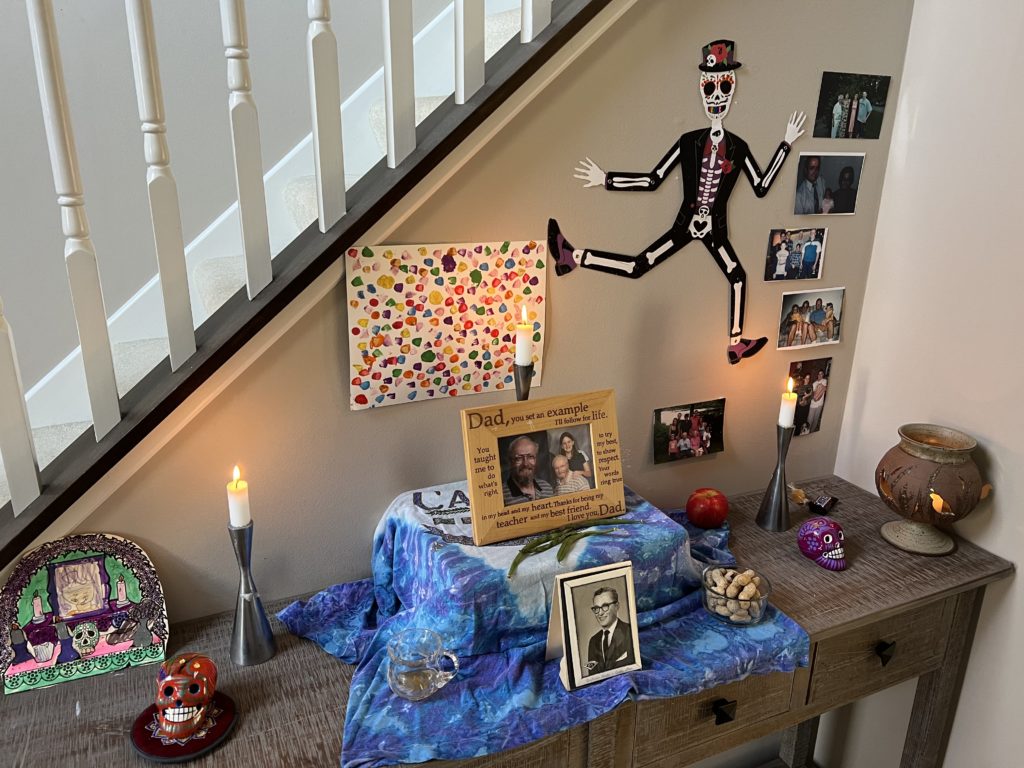
Last year was the first year I attempted an altar for the beloved dead, a sort of “Day of the Dead,” celebration that I felt conflicted about because it is not a part of my lineage, but nonetheless was the most accessible container to hold the ritual I wanted to practice. Since then, I have really been connecting with more of my own ancestral practices and learning how ancestral reverence at this time of year *is* actually a part of my lineage, if I just go far enough back to my pre-colonial ancestors (thanks to @carmenspagnola as I eagerly await my copy of @thespiritedkitchen).
Last year, we celebrated by eating doritos and peanuts in the shell (my dad’s favorite snacks), green beans (his favorite vegetable, and now also the favorite of my (oldest) 6 year old child), and washing it all down with some diet coke (his favorite drink…mine mixed with a little E&J, his favorite libation). On the surface, it seemed as though it was a typical snacktime for my kids, until my oldest climbed onto my lap and said, “I really wish I could meet Grandpa Clayton” and proceeded to cry for about two hours. Not sobbing the entire time, but definitely feeling the loss of what another grandparent would have meant in their life. Over the last 12 months, this grief of theirs has come up regularly though not frequently, and their go-to lament lately has been: “I miss your dad more than you do, you got to meet him and I never did. It isn’t fair!” My kid makes this out in sobs, and I have nothing to offer other than a validation of my own 24-year long cry of “It isn’t fair…” and all I can do is hold my child and say, “You’re right, babe, it is so unfair….”
It is unfair and it is HARD. As a parent, I want my children to know about my dad. Even more tenderly, I don’t want them to fear death. I heard death doula Rachel Rice say that “Death is only taboo in death phobic cultures” and I don’t want to hide the reality of death from my children so I have to face it for myself. And I no longer want to conflate the absence of grief with a joyful existence. If “joy” requires ignoring or bypassing pain, it isn’t joy at all, it is loneliness. So I am sharing on social media this year, not to broadcast my pain, but in the hopes that anyone reading this will feel less lonely. I see you, too. I am with you.
Despite my eldest’s emotional displays, I only cried briefly during our celebration last year. It was while we sang “Home on the range” (a song I remember my dad singing often, can still hear him sing, and I think of him every time I hear it) and lighting the candles. I felt proud that I was able to “keep it together” for the kids.
This year, my tears started flowing as we were assembling the altar. Through my unfolding grief practice these last 9 months, I wanted to allow them to come– knowing that my tears are a metabolization of my grief and an offering of my love that no longer has anywhere to go. And yet, I still felt discomfort. I found myself feeling that I had to dismiss myself and cry privately, not because I desired privacy, but because I worried about how my children and partner might feel or respond. But I stayed, I stood by the half-completed altar and let the tears flow. My partner noticed, took a break from cooking dinner, and held me. My eldest asked me why I was crying, “I really love him and miss him” I said, and they held me, too. I feel proud that I let myself “fall apart” and allow my family to hold me and care for me in that moment.
I am not going to hide my grief, I can’t protect my kids from grief or death, nor do I even want to anymore. I will model for my kids the most human of emotions and I can normalize how we can hold it, be with it. Together.